
Recorded on Thursday, January 13, 2022 9:00am-10:45am EST Virtual, ON24
The Department of Defense continues to make digital transformation strides through modernization measures such as its Joint Warfighter Cloud Capability and Cybersecurity Maturity Model Certification programs. In the evolving defense landscape, DoD agencies are currently working to modernize across areas including acquisition, engineering, data sharing and cybersecurity.
Join GovCon Wire Events’ DoD: Digital Modernization Forum to hear eminent defense department and industry executives speak on how modernization initiatives are shaping strategies, approaches and operations throughout DoD agencies and their private sector partners.
Dr. Lisa Costa, chief technology and innovation officer of the United States Space Force, will serve as the event’s keynote speaker and deliver an insightful address focused on how Department of Defense agencies are working to accelerate modernization efforts across critical areas, such as the rapidly-growing space domain, to retain the nation’s competitive edge against global adversaries.

Johnathon Caldwell is the Vice President of Business Innovation Transformation & Enterprise Excellence for Lockheed Martin Space. Mr. Caldwell ensures the business is effectively governing and utilizing information as an asset, guides data analytics and artificial intelligence capabilities, and drives data- related business direction with speed and agility. He is the lead voice for coordinating and communicating data and analytics strategy with senior executives, as well as embedding cultural transformation initiatives across the Space enterprise. He is responsible for creating value and shaping enterprise strategy by applying innovation capabilities to continuously understand, track and predict what our customers value as market trends and competitive landscapes change. Mr. Caldwell serves on the Space Executive Leadership Team and reports directly to Rick Ambrose, Executive Vice President of Space. The Space CIO position is matrixed into Mr. Caldwell and includes value-added affordability, program resiliency for classified and unclassified processes and infrastructure. Previously, Mr. Caldwell served as Vice President of the Navigation Systems mission area within Lockheed Martin’s Military Space line of business. In this role, he was responsible for the company’s advanced Positioning, Navigation and Timing (PNT) mission solutions, including the Global Positioning System III (GPS III) and GPS III Follow On (GPS IIIF) satellites, as well as the GPS Operational Control Segment (OCS) upgrade and GPS Sustainment programs. These evolutionary systems are improving PNT services for civilian and military users, and delivering advanced anti-jam capabilities, yielding superior system security, accuracy and reliability, to our warfighters. Mr. Caldwell’s career includes a series of progressive leadership roles within the Navigation Systems and Overhead Persistent InfraRed (OPIR) mission areas including Program Management, Space Segment Director, and Chief Engineer responsible for the overall GPS III Space Vehicle, as well as roles in Program Management, Payloads, Systems Engineering, and Supply Chain, developing and delivering space and ground systems for the Space Based InfraRed Systems (SBIRS) missile warning missions. As a Guidance Navigation and Controls (GN&C) and Avionics engineer, he supported production and flight operations of Commercial Communications satellites as well as MILSTAR and DSCS protected communications systems and led Independent Research and Development (IRAD) for guidance sensors. Mr. Caldwell holds a Bachelor of Science degree in Aerospace Engineering from the University of Colorado (1996). He is a graduate of Lockheed Martin’s Leadership Excellence & Development Program, Program Management Development Program and Executive Development & Growth Enhancement Program, as well as a two-time recipient of the Lockheed Martin Corporate NOVA Award, which recognizes individuals and teams for their exceptional contribution to the company’s mission and business objectives.
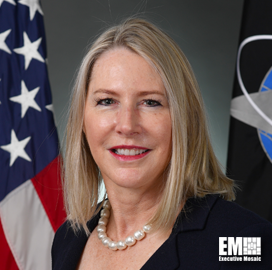
Dr. Lisa A. Costa, a member of the Senior Executive Service, is the first permanent Chief Technology and Innovation Officer (CTIO) of United States Space Force. In this role, she is charged with unlocking and harnessing innovation to leverage increased speed and advantage. She is responsible for developing strategy and policy to advance Science and Technology and Research, Development, Test, and Evaluation; employing cutting edge technologies to digitally transform the USSF; assuring USSF information technology needs are met; effectively managing USSF data; and conducting analysis supporting all USSF staff elements. Prior to her current CTIO role, she served as Director, Communications Systems and Chief Information Officer for U.S. Special Operations Command (USSOCOM), MacDill Air Force Base, Florida. Dr. Costa also served as the Senior Director of Innovation and Technology at Engility Corporation where she brought big data and artificial intelligence (AI) to client verticals. She served as the Vice President of Intelligence and Chief Scientist at PlanetRisk, a global leader in 365/24/7 real-time predictive risk analytics. She brought progressive leadership to complex and sensitive problems facing nations and global Fortune 500 companies. She is an expert in ubiquitous technical surveillance and tradecraft. She was formerly the Director of Countering Weapons of Mass Destruction (CWMD) and Violent Extremism at MITRE where she chaired the MITRE Corporate CWMD/Counterterrorism Council and led projects for the nation. Before that, Dr. Costa was the Executive Director of Integration and the Enterprise Systems Engineer for MITRE’s National Security Center responsible for integrating sponsor outcomes across various missions, agencies, and programs. She provided executive strategic planning for business operations and advancing the Center's $1.2B business base. She advised HASC and SASC staffers on emerging science and technology. She advised new presidential administrations on emerging global risk and opportunities. As a member of the Defense Science Board on numerous Task Forces and Summer Studies, Dr. Costa helped shape the US model for homeland security, special operations’ role in countering terrorism, developed novel approaches to WMD early warning, and championed the use of publicly available information for great power competition. Dr. Costa was MITRE’s Chief Scientist for every Combatant Command and Defense and Service Intelligence agency in the DoD. She was on the OSD Senior Technical Experts Group and led MITRE’s Independent Research and Development (R&D) to develop patented, globally licensed work in advanced data analytics. Dr. Costa was responsible for establishing the largest data repository and AI-enabled data mining capability outside the National Capital Region in support of special mission unit target adjudication. As Director of the Non-Traditional Information and Knowledge Exploitation cell at USSOCOM, she led multidisciplinary teams to develop worldwide intelligence assessments. These efforts were at the request of Combatant Commanders to the Chairman, Joint Chiefs of Staff. This model was used for developing intel/ops centers across the globe

Mike Galbraith was sworn in as Chief Digital Innovation Officer (CDIO) of the Department of Navy (DoN) and has been part of the DoN CIO leadership team since 2019. Mike is an accomplished global IT Leader with a successful track record in delivering value to global businesses through innovative information technology solutions across multiple industries. He has led a number large global IT and Engineering organizations and has of extensive experience in leading the IT & technology integrations of over 100 mergers, acquisitions and divestures. As a C-Suite executive with over 30 years of global IT leadership experience, Mike has helped large, complex companies plan and lead enterprise-wide, global transformation initiatives. He has extensive experience developing multi-year strategies and execution roadmaps, managing transformational ERP programs, leading large-scale legacy system and network modernization to cloud-based and SaaS-based offerings and delivering technology innovations including Big Data & Advanced Analytics, AI/ML & RPA and Digital Factory & IoT/Industry 4.0. Initiatives.
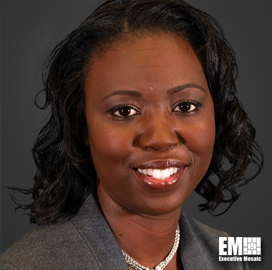
In her current role as Vice President & Chief Information Officer (CIO) for Lockheed Martin Space, Dorcia strategically aligns to the Enterprise IT organization and the LM Space Business Area. As Lockheed Martin Space CIO, she is committed to implementing the technologies and support services important to the Lockheed Martin Space Business Area. Dorcia leads a team of IT professionals focused on developing and implementing agile IT strategies, leveraging IT innovations, and maintaining flawless execution for program success and competitive advantage. Dorcia has been with Lockheed Martin for seventeen years and has held multiple leadership positions. Prior to her current role, she was Deputy to the VP of Engineering for the Training & Logistics Solutions (TLS) Line of Business within Rotary & Mission Systems (RMS). In this role Dorcia led return-to-green efforts for multiple programs and worked key efforts to improve engineering performance and overall program operations. Throughout her career with Lockheed Martin, Dorcia has held multiple positions of increasing responsibility including: • Engineering Lead for a $500M portfolio of training solutions programs • International assignment leading 200+ engineers based in the Netherlands • Software Engineering Senior Manager leading efforts to staff a 650+ employee software engineering organization • Led Program Management and Engineering transition efforts from heritage Global Training and Logistics (GLTL) to Mission Systems and Training (MST) organization • Lead Engineer for the Littoral Combat Ship Training Courses and National Cyber Range programs Dorcia has completed several development programs and received multiple awards during her career at Lockheed Martin. • Lockheed Martin NOVA Award • Three-time Lockheed Martin Galaxy Award • Two-time Black Engineer of the Year Award • Leadership Excellence and Development Program Graduate • MST Program Management Talent Initiative Graduate Dorcia has a Bachelor of Science degree in Chemical Engineering, a master’s degree in Computer Systems Engineering and a Master of Business Administration degree with a concentration in Organizational Behavior. She is currently in the process of moving with her husband and two children to the Denver, Colorado area.
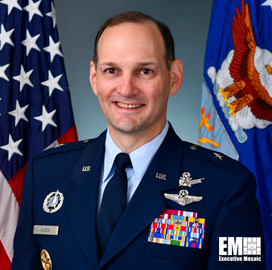
Brigadier General John M. Olson is the Mobilization Assistant to the Chief of Space Operations, Headquarters United States Space Force and the Chief Data and Artificial Intelligence Officer for the Department of the Air Force, Pentagon, Washington, D.C. He assists and advises the Chief of Space Operations with responsibility to organize, train, and equip space forces, develop and acquire military space systems, and conduct space operations to advance and protect U.S. and allied interests. General Olson is the Space Force lead for Joint All Domain Command and Control and the Advanced Battle Management System. As the first Chief Data and Artificial Intelligence Officer for the Department of the Air Force, he leads both Air Force and Space Force data and AI initiatives in technology, innovation, personnel, mobility, logistics, maintenance, and energy. General Olson also flies as an Airborne Emergency Action Officer aboard the Looking Glass Airborne Nuclear Command Post leading strategic deterrence missions. General Olson has five engineering degrees including graduation from the U.S. Air Force Academy and earning master’s degrees in engineering from the University of Illinois and the University of Tennessee, and a Doctorate in Systems Engineering from Auburn University. General Olson has held numerous air, space, cyber, acquisition, test, weapons, political-military, intelligence, and technology command, staff, and leadership roles at all levels. He is a graduate of the U.S. Air Force Test Pilot School, a freefall parachutist, and a former European and Eurasian Foreign Area Officer. Gen. Olson deployed to Southwest Asia, supporting air and space operations for operations Enduring Freedom in Afghanistan and New Dawn in Iraq, Odyssey Dawn in Libya, and Joint Task Force Horn of Africa. The General transitioned to the Air Force Reserve in 2004 after joining NASA, where he served as a Senior Executive Service leader in several civil space leadership roles for nearly a decade, earning the Presidential Rank Award. In his industry capacity, he served as a CEO, President, Vice President, and General Manager in both public and private corporations for 9 years, following 25 years of federal civil service culminating as the Assistant Director for Space and Aeronautics in the White House Office of Science and Technology Policy. Prior to his current assignment, General Olson served as the Mobilization Assistant to the Commander, 16th Air Force, Air Forces Cyber, and Joint Forces Headquarters-Cyber at Joint Base San Antonio leading 49,100 Airmen responsible for Information Warfare.
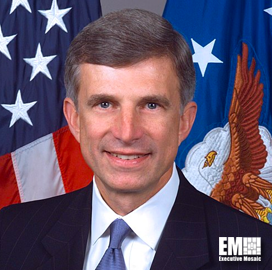
Dr. Ronald M. Sega is currently the Chief Technology Officer for the U.S. Army Futures Command. Dr. Sega served as Director and Woodward Professor of Systems Engineering at Colorado State University (CSU) from 2007 and Special Assistant to the Chancellor for Strategic Initiatives from 2013 to 2019 (currently on Leave of Absence from CSU). The Systems Engineering graduate program was developed to address increasing complexity and competition in national and economic security areas and now has approximately 130 Ph.D. students, 90 percent U.S. citizens, and for AY 2018-19 was Ranked #1 for Engineering Ph.D. Programs having an Online option. From 2010 to 2013, he was Vice President and Enterprise Executive for Energy and the Environment at CSU and The Ohio State University, a unique, shared positon between two Land-Grant universities. Dr. Sega also held the position of Vice President for Energy, Environment, and Applied Research with the CSU Research Foundation from 2007 to 2010. Dr. Sega has had an extensive career in government service, academia, research, and the private sector. He graduated with a Bachelor of Science in Math and Physics from the U.S. Air Force Academy in 1974 as a distinguished graduate. He received a Master of Science in Physics from The Ohio State University in 1975 and a Ph.D. in Electrical Engineering from the University of Colorado in 1982. His active-duty assignments included instructor pilot and Department of Physics faculty member at the U.S. Air Force Academy. He entered the Air Force Reserve in 1982 with the 901st Tactical Airlift Group at Peterson Air Force Base, Colorado, serving in a variety of operations positions. From 1987 to 2001, he served at Air Force Space Command in several assignments within Force Enhancement, Plans, Operations, the Space Warfare Center, etc., and as Mission Ready Crew Commander for satellite operations for the Global Positioning System, Defense Support Program and Midcourse Space Experiment. A command pilot with more than 4,000 flying hours, he retired from the Air Force Reserve in 2005 as a Major General, last serving as the Reserve Assistant to the Chairman of the Joint Chiefs of Staff. Dr. Sega joined NASA as an astronaut in 1990, making his first shuttle flight in 1994 aboard the Space Shuttle Discovery. Dr. Sega was Co-Principal Investigator and Program Manager for the Wake Shield Facility which was a primary payload on this mission, a first for a member of the Astronaut Corps. From November 1994 to March 1995, he was NASA's Director of Operations, Russia, responsible for managing NASA activities supporting astronaut and cosmonaut training for flight on the Russian Mir space station and also became the first American to do EVA training in the Russian Hydrolab. He completed his second shuttle flight in 1996 as payload commander for the third shuttle/Mir docking mission aboard Atlantis, completing his astronaut tenure with 420 hours in space. From 1982 to 2013, Dr. Sega was a faculty member in the Department of Electrical and Computer Engineering at the University of Colorado at Colorado Springs with a rank of professor since 1990, and Emeritus Professor since 2014. In addition to teaching and research activities, he was Technical Director of the Laser and Aerospace Mechanics Directorate at the U.S. Air Force Academy’s F.J. Seiler Research Laboratory, and Assistant Director of the Space Vacuum Epitaxy Center, including management of the Wake Shield Facility Flight Programs at the University of Houston. Dr. Sega was the Dean of the College of Engineering and Applied Science at the University of Colorado from 1996 to 2001, adding six degree programs to the College and a remote offering of the Masters of Engineering in Space Operations. In August 2001, Dr. Sega was appointed as Director of Defense Research and Engineering, Office of the Secretary of Defense, serving as the chief technology officer for the Department and the chief adviser to the Secretary of Defense and Under Secretary of Defense for Acquisition, Technology and Logistics for scientific and technical matters. Major Science and Technology (S&T) initiatives included: the National Aerospace Initiative, Surveillance and Knowledge Systems, and Energy and Power Technologies. Rapid reaction efforts included the Combating Terrorism Technology Task Force. Disruptive technology investments were made in areas such as small responsive satellites, hypersonics, and quantum technologies. Dr. Sega led the development of the National Defense Education Program. He co-chaired the whole-of-government study on critical skills and co-chaired forums with commercial satellite companies. Integrating efforts, within and outside of DoD, included moving the Defense Technical Information Center to the Office of DDR&E to develop a responsive global digital database, and expanding the Space Partnership Council. Dr. Sega was Under Secretary of the Air Force, Washington, D.C. from 2005 to 2007. He was responsible for all actions of the Air Force on behalf of the Secretary of the Air Force and was acting Secretary in the Secretary's absence. In addition to support of the Secretary, his specific portfolio responsibilities included the AF space programs, R&D, and was the senior energy official. Designated the Department of Defense Executive Agent for Space, Dr. Sega developed, coordinated and integrated plans and programs for space systems and the acquisition of all DoD space major defense acquisition programs. He instituted a “Back-to-Basics” approach to space systems acquisition which was applied to GPS III after extensive interagency coordination. Under his tenure, policy inputs were made for the National Space Strategy, an Operationally Responsive Space organization was stood up, policy changes were made for existing national launch ranges, a U.S. Space Industrial Base study was conducted, and orbital launch activities were expanded at Wallops, VA, and Kodiak, AK. Dr. Sega initiated and facilitated an international space partnership with Australia involving significant collaboration on the Wideband Global SATCOM (WGS) constellation. Dr. Sega also led the Air Force team that won the overall Presidential Award for Leadership in Federal Energy Management for 2006. Dr. Sega has authored or co-authored 150 technical publications, has served on numerous local, regional, national and corporate advisory and governance boards since leaving government service in 2007. Examples include six years on the Air University Board of Visitors, chairing the Air Force Institute of Technology Subcommittee, and eight years on the United States Army Science Board, recently chairing studies on the “Future of Army Aviation” (2015), “Multi-Domain Battle” (2017) and “Multi-Domain Operations” (2018). Dr. Sega served as a director on for-profit corporation boards and on boards for non-profit organizations including the Alaska Aerospace Corporation and the United States Space Foundation. Dr. Sega has also participated in several national studies including chairing the 2010 National Academy study entitled: “Controlling Cost Growth of NASA Earth and Space Science Missions,” and Vice-Chair of the 2012 Academy study entitled: “NASA’s Strategic Direction and the Need for a National Consensus”. Dr. Sega is a Member of the International Society of Astronautics, a Fellow of the American Institute of Aeronautics and Astronautics, and a Life Fellow of the Institute of Electrical and Electronics Engineers.
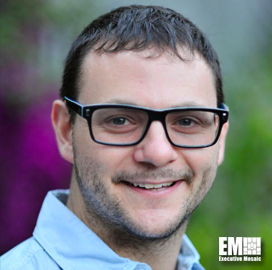
Stuart Wagner is the Chief Digital Transformation Officer for the Department of the Air Force, comprised of the U.S Air Force and U.S. Space Force. On behalf of the Chief Information Officer, Mr. Wagner promotes innovation and digital transformation to enable warfighters globally, helps build the digital workforce, and implements artificial intelligence and autonomous capabilities. His areas of interest include telemetry instrumentation, collection, unification and analysis, natural language processing, and improving partnerships between the venture community and government. Mr. Wagner began his career as the Aide De Camp to the CEO and COO of Berico Technologies, a defense contractor focused on data fusion. He then enlisted in the U.S. Army, and attended Officer Candidate School. While there, he broke three ribs on an obstacle course and continued training for weeks while hurt, eventually resulting in an honorable discharged. Mr. Wagner then learned to code and became a Software Developer at Microsoft. There, he instrumented and analyzed telemetry data from Windows Devices at billion+ user scale to improve reliability and Azure subscriptions to improve revenue growth. At a Microsoft hackathon, he helped prototype a sex trafficking disruption application that won the competition and now is used by over 12 US cities to reduce the supply and demand of sex trafficking. Returning to the Department of Defense in 2019 to work as a Senior Advisor to the Chief Data Officer of the Department of Defense, Mr. Wagner built and ran a team of 50+ engineers to run Development and Engineering for Advana, an analytics platform at OUSD(C), and start Gamechanger, an opensource natural language processing and search platform that enables text analytics on policy documents, DoD contracts, and communications traffic among other use cases. Mr. Wagner is an active angel and venture investor, and serves on the board of a charitable foundation. Mr. Wagner received a Bachelor of Arts degree triple-majoring in Political Science, Arabic, and Organizational Studies from the University of Michigan, a Master of Science in Public Policy and Administration from the London School of Economics and Political Science, and a Master of Science degree in Computer Science from the University of Pennsylvania. EDUCATION 2007 Bachelor of Arts, Political Science, Arabic, and Organizational Studies, University of Michigan 2009 Master of Science, Public Policy and Administration, London School of Economics and Political Science 2016 Master of Science, Computer Science, University of Pennsylvania CAREER CHRONOLOGY 2009-2011, Special Assistant to the CEO and COO, Berico Technologies 2011-2012, Officer Candidate, US Army 2013-2014, Manager of Technology and Analytics, Contractors Steel Company 2015, Technical Intern, Upthere 2015, Teaching Assistant in Distributed Systems, University of Pennsylvania 2016-2019, Software Development Engineer, Microsoft Corporation 2019-2021, Senior Data Scientist, Department of Defense 2021-Present, Chief Digital Transformation Officer, Department of the Air Force (Current as of April 2021)
9:00am - 9:05am EST
Opening Remarks
9:05am - 9:40am EST
Keynote Address
9:40am - 10:40am EST
Panel Discussion
10:40am - 10:45am EST
Closing Comments